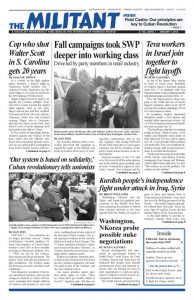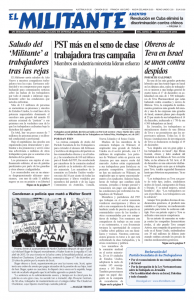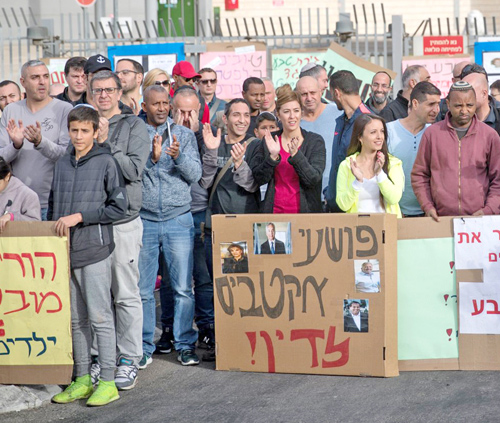In one of the largest labor actions in Israel in recent years, thousands of workers joined a four-hour general strike Dec. 17 in solidarity with Teva Pharmaceutical workers fighting layoffs and plant closings announced Dec. 14.
Teva, the largest generic drug company in the world and one of Israel’s biggest companies, plans to lay off 25 percent of its workers, including 1,750 of its 6,400 workers in Israel.
In Jerusalem, workers barricaded themselves inside a Teva factory and wouldn’t allow supervisors to leave. All 11 of Teva’s factories and research facilities went on strike Dec. 19.
“The layoffs are a big blow to working people in Israel,” Eliran Koznik, a Teva worker and Histadrut union leader in Kfar Saba near Tel Aviv, said by phone Dec. 18. “A lot of people believed that if you worked for Teva, you would have financial security until you got your pensions. It’s not like that anymore.”
“Workers at Teva come from all walks of life, Jewish, Arab citizens of Israel, immigrants from Russia and Ethiopia. And it’s half women, half men,” he said. “The workers are not the problem. The workers are the solution.”
While Teva produces scores of generic drugs, its biggest profit maker was Copaxone, a drug for treating multiple sclerosis. But that patent expired and Teva faces increased competition.
In a bid to strengthen its edge against rivals, Teva last year bought Activis, a U.K.-based generic drug company, saddling itself with $35 billion in debt just as prices for many generics were falling.
Over the last decade the Israeli government gave the company some $6.2 billion in tax breaks and subsidies. That, along with ostentatious benefits to top executives, irks many of the workers.
“Recently all of management got big bonuses,” Koznik said. “Why should workers have to pay for bad administration?”
Teva workers learned about the cuts from the media. “Everything about the layoffs and closing of some of the factories was a surprise to the workers,” Koznik said. “We want Teva to negotiate with us.”
The composition of the workforce at Teva is not unusual for Israel. The development of industry and growing numbers of Arabs, Jews and immigrants toiling side by side have opened the door to deepening class struggle as today’s crisis of capitalism unfolds.
A Dec. 15 article by Matti Friedman, Jerusalem-based correspondent for the Toronto Globe and Mail, described a piece of the changing relations between Jewish and Arab workers.
Friedman notes that after President Donald Trump announced Dec. 6 that Washington would officially recognize Jerusalem as Israel’s capital and eventually move its embassy there, “Arab leaders called for ‘days of rage’ and a chorus of Western observers predicted an explosion.”
But that’s not what happened. The protesters who showed up at Old Jerusalem’s Damascus Gate “were outnumbered by journalists,” Friedman says. “There weren’t spontaneous mass celebrations on the Jewish side or mass disturbances on the Arab side. The past week has been fairly normal.”
“Nearly half the city’s Arab workers are now employed in Jewish areas,” he said. “Salaries in Palestinian homes increasingly come from Israeli employers,” so Palestinians and Jews in Israel “are becoming more tightly entwined, and everyone has more to lose if things fall apart.”
Friedman says that anyone wanting to understand Jerusalem today needs to visit the city’s Talpiot industrial zone. A big supermarket there is in “an Israeli area,” he said, but of the 50-odd workers I counted among the aisles of produce and cereal, at least two-thirds were Palestinian.” A Jewish cashier was serving three Muslim women. At a SuperPharm an Arab female pharmacist was “serving a Jewish woman with a prescription, a Jewish cashier and two Arab guys stocking the shelves,” Friedman wrote. “Ten years ago, it would have been remarkable to see Palestinian customers or salespeople in a Jewish part of town, but today what’s remarkable is how unremarkable it’s become.”
A new poll in Israel reports that 84.3 percent of Arabs and 63.7 percent of Jews believe they should coexist. The study reports 84.2 percent of Arabs want their children to learn Hebrew, while 56.4 percent of Jews think their kids need to learn Arabic.
Anti-Israel boycott loses steam
This reality makes it harder to paint Israel as a pariah nation or an outcast that should be destroyed. That’s one of the reasons the Boycott, Divest and Sanctions movement against Israel is losing steam.
More musicians are refusing to give in to pressure to cancel their concerts in Israel. Among musicians who have toured Israel recently or have upcoming tours are Radiohead, Bon Jovi, Elton John, Neil Young, Bryan Adams, Nick Cave, Lorde and the Cuban band Pasión de Buena Vista, formed in tribute to the internationally known Buena Vista Social Club, which performed in Tel Aviv, Jerusalem and Haifa in December.
In July Nasreen Qadri, an Israeli-Arab musician, wrote in Newsweek that politically pressured cancellations are “hurting those who wish to promote peace and tolerance in a troubled region.”
“I was born in Haifa and grew up in Lod — two cities with a mix of Arab and Jewish communities, living side by side. It wasn’t always easy, but my personal experience has taught me that open dialog is the only way to overcome our differences,” she wrote. “Those who call for boycott are only trying to divide us.”
A Dec. 8 editorial in the Jerusalem Post criticized a law passed in the Knesset in March that bans entry to Israel of foreigners who publicly back the boycott. “People should not be penalized for their political views. Truth is the best remedy,” the editors said.


